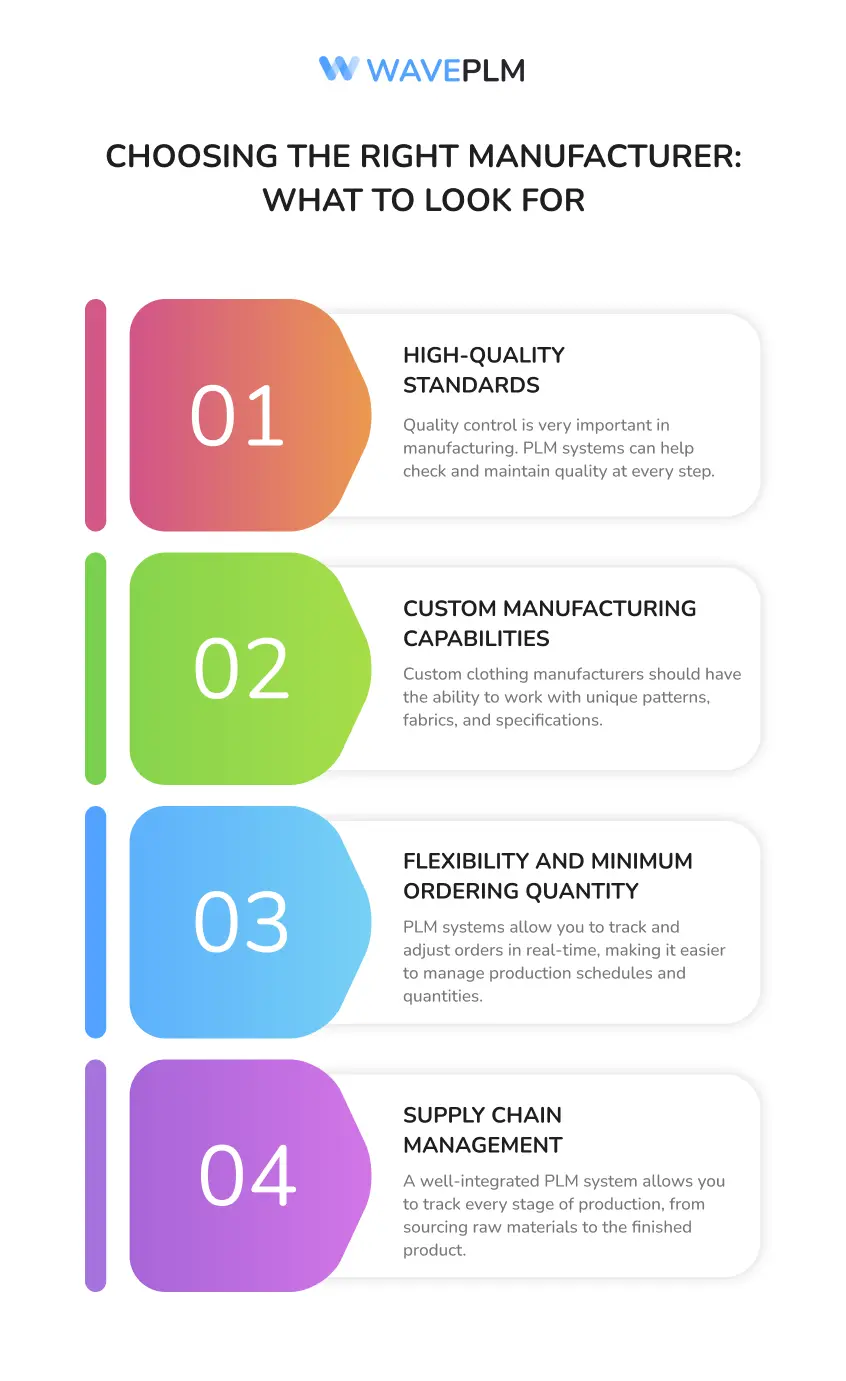
Finding the right clothing manufacturer is crucial for fashion brands looking to create high-quality, custom clothing that aligns with their vision. If you are a product designer or a fashion brand owner, picking the right manufacturer is important. It affects your product development, timelines, and costs.
A powerful apparel management software tool that can simplify the entire process is Product Lifecycle Management (PLM) software. PLM systems make sourcing, communication, and quality control easier. They help you find the best option for your needs.
Why Choosing the Right Clothing Manufacturer Matters
When you’re building your brand, selecting a clothing manufacturer is one of the most important decisions you will make. Your manufacturer will handle a significant part of the manufacturing process, from sourcing materials to producing the final product. The right manufacturer can help make sure your clothing meets quality standards and arrives on time. A bad choice can cause delays, extra costs, and quality problems.
The ability to collaborate with a manufacturer who understands your needs and aligns with your business goals is essential. For custom clothing brands, finding a manufacturer is very important. They need one that can handle unique designs.
The manufacturer should also manage flexible production volumes and produce high-quality items. This can really change the game for the brand.
A fashion PLM system helps you by giving real-time access to product data. It makes manufacturing easier and improves communication.
Streamlining the Manufacturing Process with PLM Software
PLM software simplifies every stage of the product lifecycle, from product design to manufacturing. It centralizes product data and automates various tasks, making it easier to manage the flow of information between product designers, manufacturers, and other stakeholders. This efficiency can save your business both time and money while helping you maintain control over the manufacturing process.
With a PLM system, you can store all relevant product information—such as materials, designs, patterns, and technical specifications—in one place. This data can be easily accessed and shared with clothing manufacturers, which helps minimize errors and misunderstandings.
PLM tools also allow for seamless integration with other software systems, such as Enterprise Resource Planning (ERP), to further streamline your workflows.
Choosing the Right Manufacturer: What to Look For
When evaluating clothing manufacturers, several key factors should guide your decision. Apparel PLM can help you evaluate these factors more easily. It gives you insights into your manufacturing partners’ abilities and performance.
- High-Quality Standards The manufacturer’s ability to meet your brand’s quality standards is essential. Quality control is very important in manufacturing. PLM systems can help check and maintain quality at every step. PLM tools help you track material choices, design details, and manufacturing steps from start to finish. This ensures consistency and meets quality standards.
- Custom Clothing Manufacturing Capabilities If your clothing line involves custom clothing, you’ll need a manufacturer that can produce items tailored to your designs. Custom clothing manufacturers should have the ability to work with unique patterns, fabrics, and specifications. Apparel PLM facilitates this by keeping detailed records of every customization, making it easier to communicate your requirements and ensure they are met.
- Production Flexibility and Minimum Ordering Quantity Flexibility in production is crucial, especially if you’re a small or growing fashion brand. Some manufacturers have strict minimum ordering quantities (MOQs) that may not align with your needs. PLM systems allow you to track and adjust orders in real-time, making it easier to manage production schedules and quantities. Whether you’re ordering small batches or large quantities, a PLM system can help optimize production to meet your specific requirements.
- Supply Chain Management Effective supply chain management is essential for maintaining a smooth manufacturing process. A well-integrated PLM system allows you to track every stage of production, from sourcing raw materials to the finished product. This real-time data helps you identify potential bottlenecks, delays, or quality issues early in the process. With better visibility into your supply chain, you can make data-driven decisions that optimize efficiency and reduce costs.

Improved Communication with Manufacturers
Effective communication between your design team and clothing manufacturers is vital for successful product development. PLM software fosters this communication by creating a centralized hub for sharing information. Product designers can upload design files, technical specs, and other important documents directly to the system. Manufacturers can access this data at any time, ensuring that they are always working with the latest information.
With PLM software, you can also create a streamlined approval process. As products move through different stages of development, you can set up checkpoints for approval or review. This feature ensures that all stakeholders are on the same page, reducing misunderstandings and ensuring the final product meets your expectations.
Real-Time Product Data Management
One of the most valuable features of PLM software is its ability to manage product data in real time. Whether you’re dealing with USA clothing manufacturers or international partners, having access to up-to-date information is critical. Real-time data enables you to make informed decisions about production schedules, material usage, and cost management.
For example, if there is a problem with the fabric in a design, you can find the source quickly. This lets you take action before it affects the whole production process. This capability can save you time, money, and frustration, while ensuring that your products meet the highest quality standards.
Reducing Costs with PLM Systems
Cost reduction is a constant concern for clothing brands, particularly when dealing with custom clothing manufacturers. PLM software can help you reduce costs in several ways. First, by improving data management and communication, apparel PLM minimize errors and the need for costly revisions. The software also allows you to track material usage, which can help identify areas where you can cut waste and optimize production.
Second, fashion PLM systems enable better planning and forecasting. By having a clear view of production schedules and supply chain logistics, you can avoid over-ordering or under-ordering materials. Accurate forecasting helps you reduce excess inventory, minimize storage costs, and streamline your entire production process.
Building Your Brand with the Right Manufacturer
Your clothing brand’s reputation is tied to the quality of the products you offer. By choosing the right manufacturer, you can ensure that every item you produce meets the high standards your customers expect. PLM software helps you achieve this by managing product data. It improves communication and ensures every detail of the manufacturing process is done correctly.
With a robust PLM system in place, you’ll have the tools you need to build a reliable, high-quality brand. By focusing on efficiency, cost reduction, and quality control, PLM systems help you establish a strong relationship with your manufacturer—ultimately contributing to the long-term success of your clothing brand.
Conclusion
Choosing the right clothing manufacturer is an essential step in the product development process. PLM software can make this process easier. It gives you real-time access to product data. It also improves communication with manufacturers. This helps ensure your products meet high-quality standards.
Whether you’re working with custom clothing manufacturers or USA clothing manufacturers, PLM tools help streamline your workflows, reduce costs, and optimize your supply chain. Using PLM systems helps you build your brand. You can create high-quality products that connect with your customers.





Leave a Reply